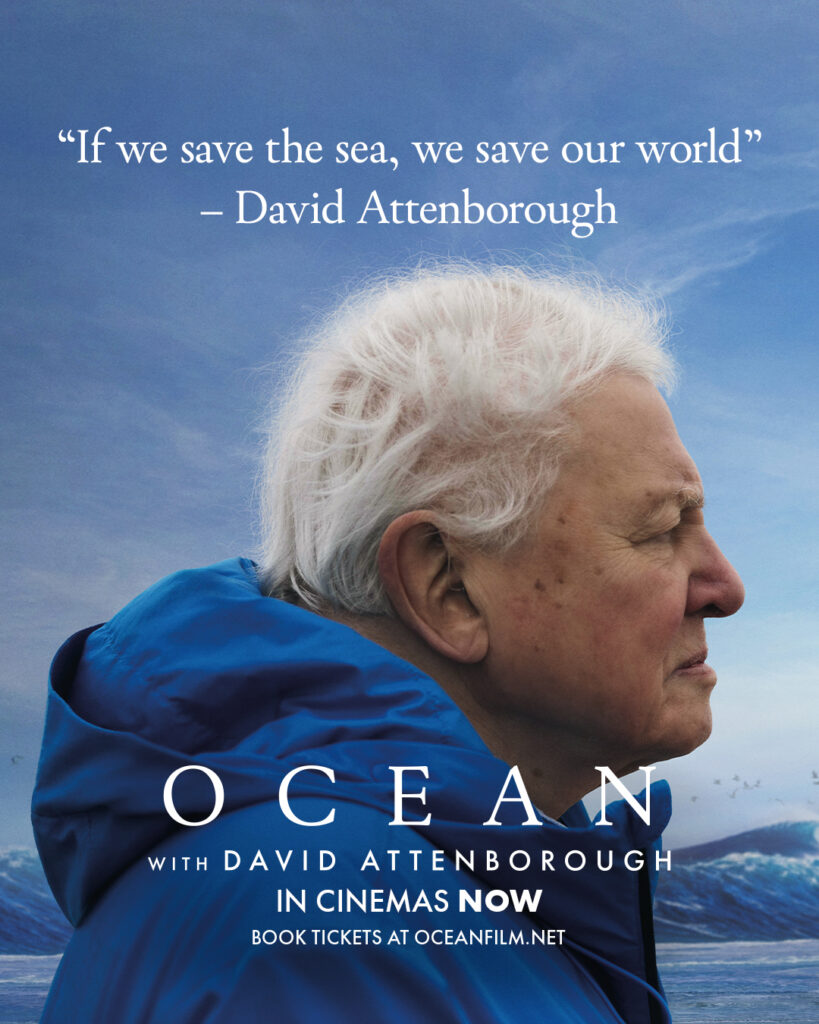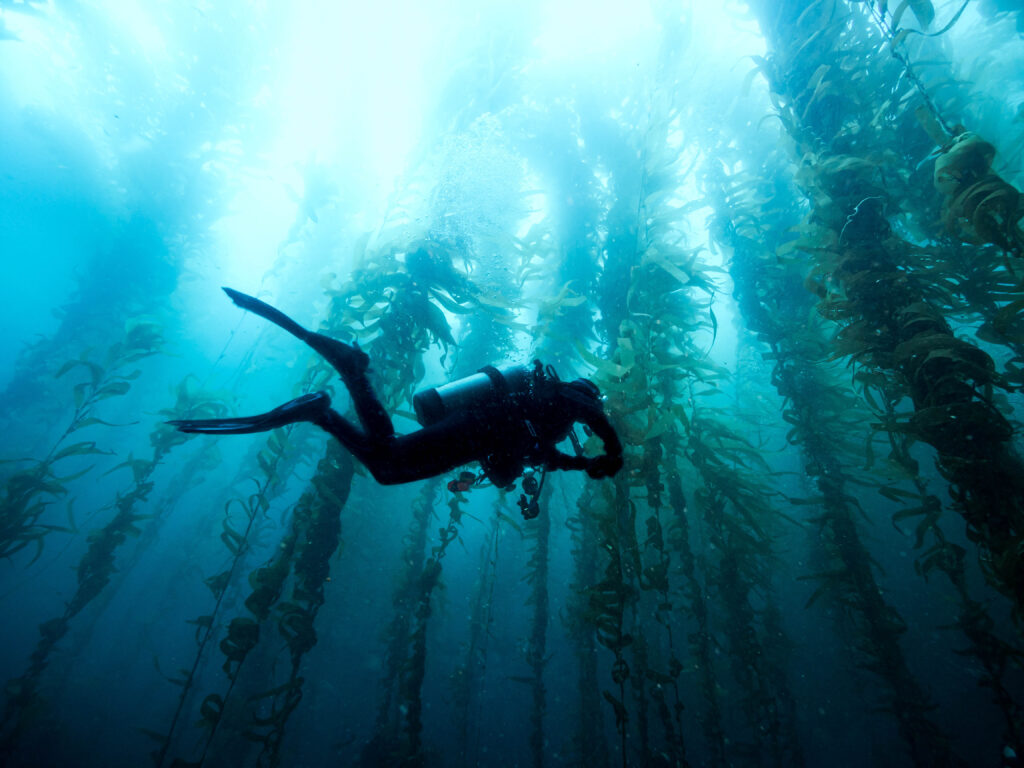
January: the Wilding Gardens conference, the start of a movement
The year begins by plummeting us into a deep freeze – snow and ice lay over the country for a week, shadowed by biting arctic
Home / David Attenborough’s ‘Ocean’ offers hope – but he urges us to act too

Anna Ford | Communications lead
Published May 2025
Oh, to have been a fly on the wall of the production meetings between Sir David Attenborough and his team when they first sat down to plan their fantastically powerful new film, Ocean.
Sir David is understood to have had a strong personal influence on the content and tone of the film. There are so many urgent stories to tell about the marine world: the blight of plastics, increasing acidification, spiralling temperatures, and melting polar ice… But Sir David picked another, perhaps the easiest of all for us to relate to, one that directly affects our lives and livelihoods: he set out to lift the veil on unsustainable fishing.

The thing is, if you watch an industrial bottom-trawler from the shore, it just looks like a large vessel trailing a huge net. “From the surface you would have no idea that this is happening” says Sir David in the film before the camera drops to the seabed to reveal the destruction wreaked upon the habitat beneath.
At breathtaking speed, gigantic metal teeth rake the bottom, unleashing carbon-rich sediment and smashing rocks and shells. Fish, squids and crustaceans swim for their lives in a desperate, and ultimately futile, attempt to flee the vast nets which capture everything in the water between the floor and the surface.
What makes this all the more obscene is that these trawlers are often just looking for one species. Once hauled on board, up to three quarters of the creatures which have been caught will be discarded.
The trawlers scrape the seabed with such force that the trails they leave at the bottom of the ocean can be seen from space. An area the size of the Amazon rainforest is trawled every year, repeatedly in some places.
The impact is not just on the fish which are caught and the seabed which is trashed. It’s also on the entire ecosystem which relies upon what is lost. And in some places, that includes coastal communities who have fished their shores for millennia, sustaining their own families. Now, however, wealthy nations send in enormous trawlers which empty the sea of fish, starving these communities. “This is modern colonialism at sea” says Attenborough.
It’s shameful that this practice is lawful anywhere on the planet, but incredibly it happens in areas which have been designated as ocean sanctuaries, known as ‘Marine Protected Areas’. And it happens in these places all over the world, including off the coast of the UK. According to the Blue Marine Foundation, bottom trawling is still permitted on 40% of the seabed in UK’s Marine Protected Areas.
Such footage of trawling has never been filmed before. David Attenborough, loved and respected by seemingly everyone, has played what may be his final hand with devastating power. In a few weeks’ time, global leaders will meet at the UN Ocean Conference in France. They have a chance to take real action to save the ocean. In December 2022, the world’s nations agreed to protect 30% of land and sea by 2030, or ‘30 x 30’ as it is known. The 30% figure was calculated by Professor Callum Roberts of Exeter University as the minimum needed to enable an ecological recovery while also sustaining local fishers and farmers.
Several years on from that decision, the amount of ocean protected still stands at only three percent. The situation could not be more critical. Species are dying as ocean temperatures have climbed off the charts. When it comes to the warming ocean, we are in uncharted waters. Our ocean – which has long been an unsung hero absorbing 90% of all human-made warming and 30% of our human-driven carbon dioxide – is almost saturated with heat and carbon, and is reaching a tipping point. Warmer waters drive extreme weather events and disrupt ocean currents, changing weather patterns in ways we cannot fully fathom. We must act to save ocean life – and ourselves.
But what can we do? Just as the teeth of the trawlers churn the seabed, Ocean with David Attenborough must stir meaningful action. Nations must act together at the UN Ocean Conference in June. “If we save the sea, we save our world” as Attenborough says at the end of the film.
As individuals, he urges us, we all have an active role to play. Greta Thunberg famously said: “no one is too small to make a difference.” And so, we can think about the food we eat, and the way we shop.

At Knepp, we’re trying to do our bit. Our Wilding Kitchen sources fish from one single local fisher who works off the coast of Bognor using a line or large-gauge nets. He’s part of the community of sustainable day-boat fishers that can help protect Marine Protected Areas, such as parts of Sussex Bay, from the bottom trawlers. We guarantee we’ll take absolutely everything he catches so there’s no waste. Some weeks this means our menu includes cuttlefish, mullet, skate and sea bass; others, it might be just one species. This keeps our chefs on their toes as they respond to what’s been caught, and it means our diners know that at Knepp they’re only ever going to be served the freshest, most sustainable fish. Our Wilding Shop will never stock products made unsustainably from ocean resources and we’re proud to showcase useful, beautiful, recycled and upcycled products made by Surfers Against Sewage and others that are powerful drivers of change.
Our charity Knepp Wildland Foundation has strong connections with the sea, too, through its Weald to Waves nature network. The project grew out of the vision in Isabella Tree’s book Wilding that one day the free-roaming animals at Knepp might be able to reach the Sussex coast via a connected ecosystem of green corridors to feed on kelp washed ashore from restored offshore forests. The ambition has grown, from a 25-mile corridor from Knepp to the sea, to 100 miles of networks based around the catchments of the Rivers Adur, Arun and Ouse. So far, 64 farmers and landowners have pledged almost 22,000 hectares within the Weald to Waves corridor. And an additional 1100 individual gardeners and community groups across Sussex have signed up, committing to improve nature on their land; all of them helping to heal the terrestrial ecosystems that directly affect our coastal waters. Weald to Waves delivers education programmes to schools about the ocean and nature too, and works closely with Sussex Kelp Restoration Project. In fact, Weald to Waves is mentioned in David Attenborough’s book ‘Ocean: Earth’s last wilderness’ which was published this month too.
There are plenty of stories of hope if you know where to look, and plenty of other things we can do in our everyday lives to help bring about the ocean transformation Sir David is calling for. We can change the way we use energy at home, and choose banks with ambitious environmental policies. We can ask our MPs what they’re doing to protect the ocean and whether they are willing to do more. We can talk with our friends, families and neighbours about why the natural world matters.
Perhaps the biggest risk we face as a species is to assume that someone else will solve this problem for us. The climate and nature crises are scary, and, naturally, we like to feel reassured by stories of hope, about nature recovering and technological advances in renewable energy. But while feeling hopeful is comforting and important, we must also act. Hope without action is just wishful thinking.
So, do go and see the Ocean film on the big screen, if you can. It will also be available to stream on TV from 8 June. And please join us and Sir David and thousands of others by writing to UK environment secretary Steve Reed and registering your opposition to bottom trawling in Marine Protected Areas. #TheBottomLine campaign is run by the highly respected Blue Marine Foundation, a partner in the Ocean film. You can sign here. Together we can do this – we can protect our marine ‘protected’ areas!
In your 100th year, thank you, Sir David, for this astonishing film and for everything you continue to do for the planet.
Header image of the Sussex coast off Worthing, courtesy of Sussex Bay. Diver in kelp image by Colby Bignell via Climate Visuals.

The year begins by plummeting us into a deep freeze – snow and ice lay over the country for a week, shadowed by biting arctic

We are looking for an engaging and passionate Shop Manager to join our team and help take the shop in exciting new directions, including possibly

We’re looking for a skilled and detail-focused Pastry / Prep Chef to join Knepp Wilding Kitchen on a permanent basis.
Knepp Wildland Safaris, our gardens and campsite are all about the quiet and patient observation of nature.
Some of the species we are likely to encounter are shy or can be frightened by loud noises or sudden movements. Our campsite with open-air fire-pits, wood-burning stoves and an on-site pond is unsuitable for small children.
For this reason, our safaris, garden visits, holiday cottages and campsite are suitable only for children of 12 and over.
You’ll receive relevant offers and news by email. This will include information about the Rewilding Project, online store products, the Wilding Kitchen Restaurant / Cafe, and other exciting experiences / events across the Knepp Castle Estate. For more information, view our Privacy Policy.